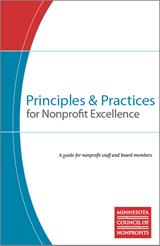
The ability of an organization to make the best use of the energy, time, and talents of its employees is essential to accomplish the organization’s mission. Nonprofit organizations should place a high priority on exercising fair and equitable practices that attract, retain, and actively engage qualified employees.
Nonprofits have an obligation to comply with and stay current on all applicable employment laws and to provide a safe and productive work environment. Each nonprofit organization should establish specific policies and practices that promote cooperation and open and effective communication among employees so that they can productively work together to advance the organization’s mission.
Employee Policies
1. Nonprofits must comply with all federal, state and local employment laws when hiring, employing and dismissing personnel. 
2. Nonprofits must comply with employment mandates, including: 
- payroll taxes,
- workers’ compensation,
- unemployment compensation,
- accurate designation of employees and contractors, and
- wage and hour laws.
3. Nonprofit organizations should adopt a set of board-approved policies and procedures for managing employees. Organizations should review and update these regularly.
4. Nonprofits should provide a safe and healthy work environment for their employees.
5. Nonprofits should establish a clear conflict of interest policy for employees. It should include disclosure of relationships and interested party transactions.
6. Nonprofits should adopt procedures that allow employees the opportunity to rectify their grievances.
7. Nonprofits should adopt a whistleblower policy to protect personnel when they report violations of organizational policy or applicable laws.
Recruitment and Retention
9. Nonprofits should employ skilled individuals who are suitable for the positions they occupy and are committed to the goals, values and objectives of the organization.
10. Nonprofits should conduct background checks on employees, particularly if their positions involve working with children or vulnerable adults, performing financial duties or serving in other sensitive areas.
11. Background checks should be conducted in a uniform and consistent way, and nonprofits must follow applicable laws with respect to background checks of prospective employees. 
12. Nonprofit organizations should provide personnel with clear, current job descriptions, a comprehensive orientation, and the resources they need to produce quality work.
13. Nonprofit organizations should define their compensation philosophy, balancing internal equity with market-based and livable compensation for all employees.
14. To the extent of their ability, nonprofits should provide employees with adequate benefits, including health insurance, and the opportunity to financially contribute to retirement plans.
15. Nonprofit organizations should create a culture of transparency and open communication where internal information is shared as appropriate. This also includes being open to input from personnel regarding the organization’s activities and results on a continual basis.
16. Nonprofits should develop a plan for how vacancies in senior leadership positions will be filled, including in the event of voluntary and unexpected departures.
17. When employees depart, nonprofit organizations should conduct exit interviews to learn from the employee’s employment experience.
18. When employees are terminated, nonprofits should provide adequate notice and information about benefit continuation, unemployment compensation, references and job placement assistance when possible.
Diversity and Inclusion
19. Nonprofits should strive toward creating a workplace that welcomes and supports employees who reflect the diversity of their community.
20. Nonprofits must establish and abide by a broad and encompassing equal opportunity employment policy. 
Training and Development
21. Nonprofits should promote staff education and development and provide opportunities for growth and advancement of personnel.
22. Nonprofit boards should budget for the professional development of their staff.
23. Nonprofit personnel should receive ongoing performance-related feedback and a formal performance evaluation at least annually.
Note to Readers: Please be aware that certain words have particular meanings in this document.
 "Must" is used to describe practices required by stake or federal law, and is noted with a gavel symbol; the online version of the Principles and Practices will soon include direct web links to relevant federal and state statutes and reporting forms.
"Must" is used to describe practices required by stake or federal law, and is noted with a gavel symbol; the online version of the Principles and Practices will soon include direct web links to relevant federal and state statutes and reporting forms.- "Should" is used to describe highly recommended practices.
- "Constituents" describes people with a stake in the success of the organization and may include members, neighbors, clients, volunteers, and contributors.